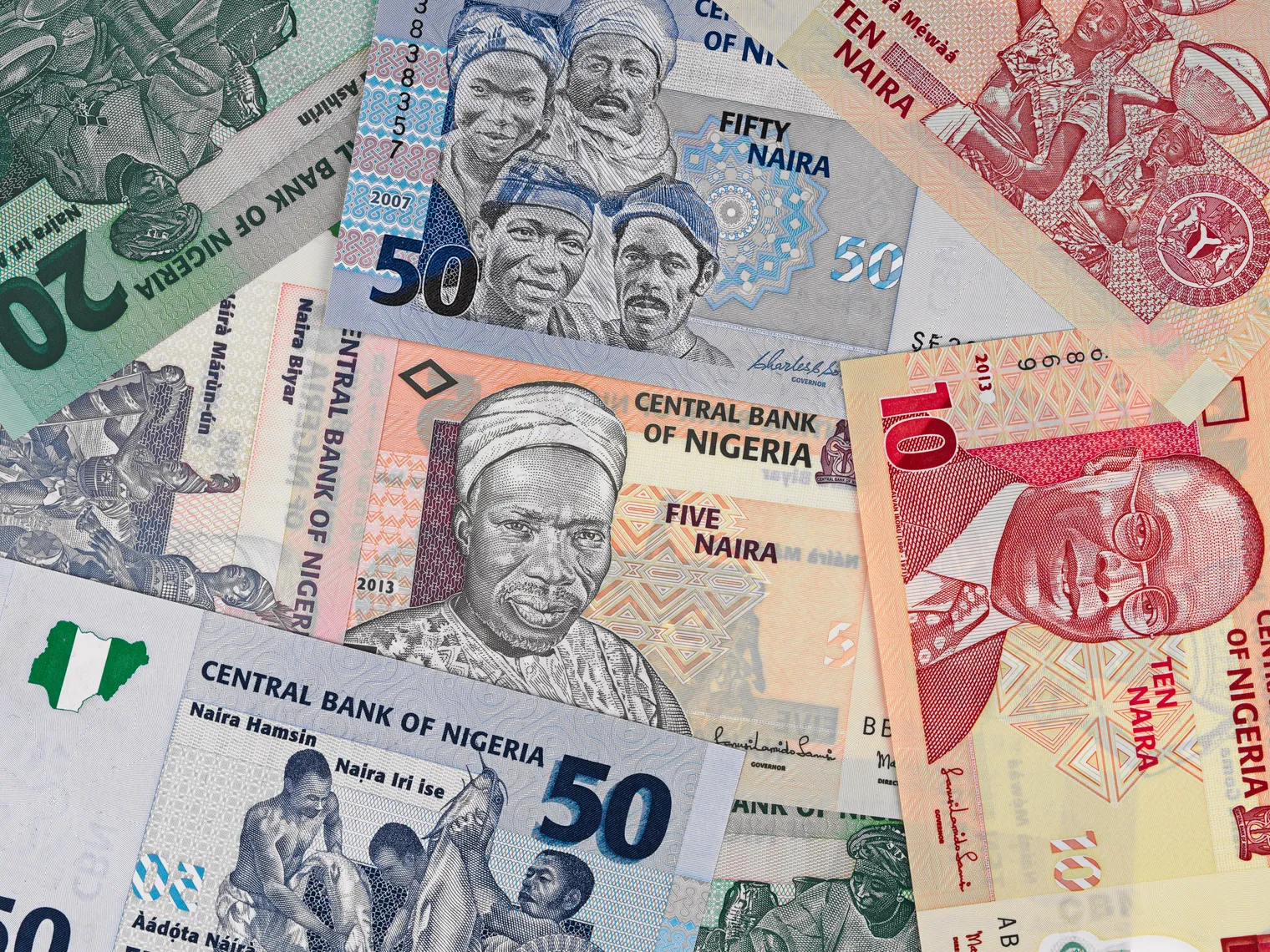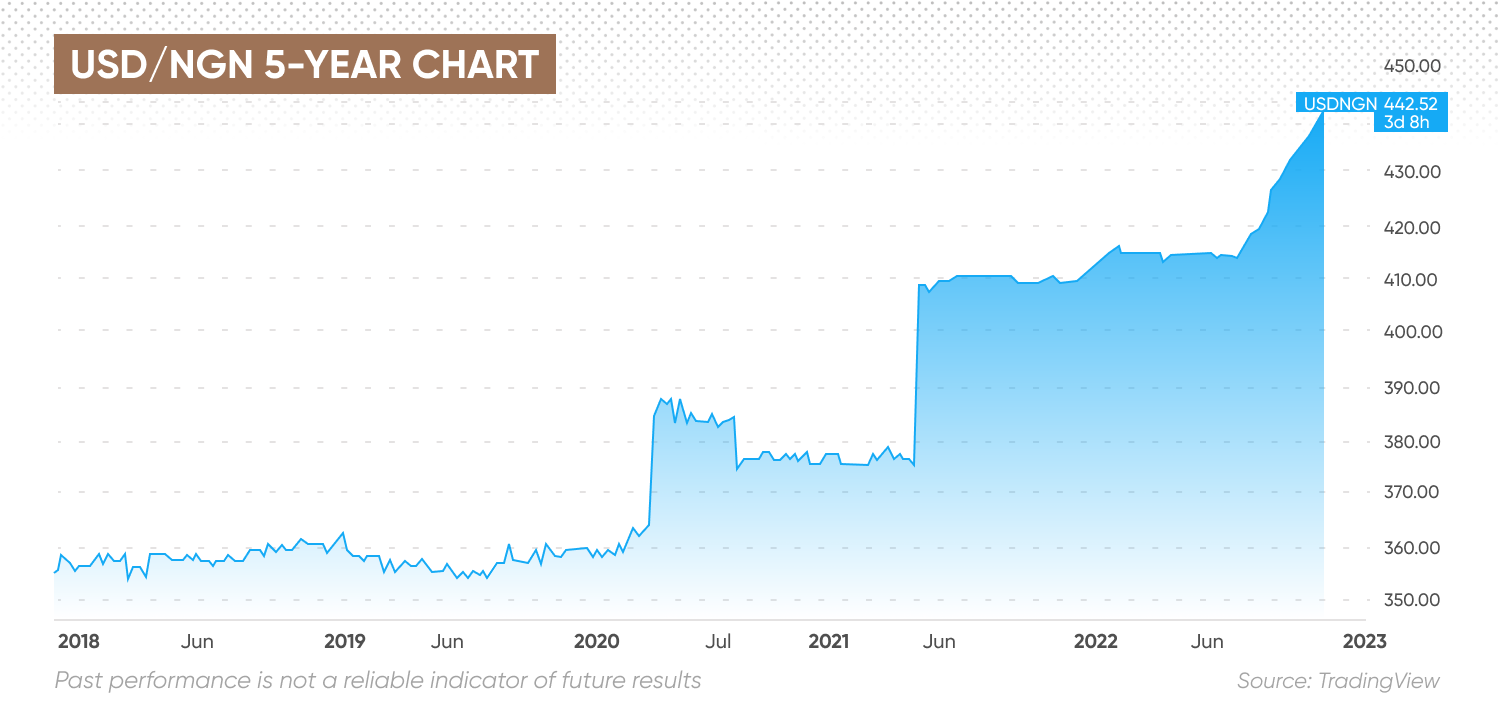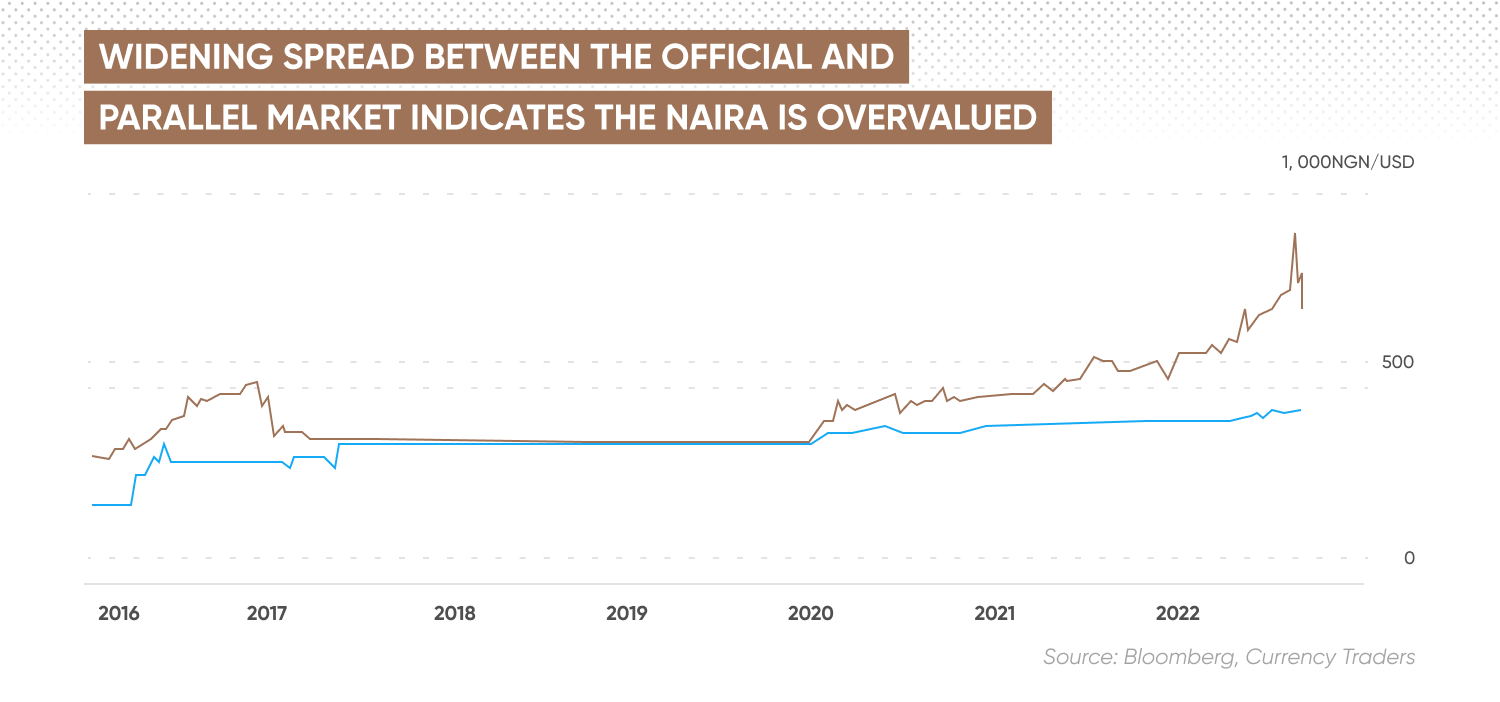Nigerian naira forecast: NGN still looking for the bottom as the Nigeria currency crisis, devaluation fears loom.
The Nigerian naira downtrend has hit a downtrend against the US dollar in recent months
The Nigerian naira (NGN) has fallen over 4.5% against the US dollar (USD) so far this year and could weaken further as the Central Bank of Nigeria (CBN) attempts to simplify the exchange rate regime to a single rate. Rising inflation, a shortage of foreign currency reserves is fueling devaluation speculation.
Read on for the latest developments driving the naira and analysts’ latest NGN forecasts.
What is the Nigerian naira?
The Nigerian naira (currency code: NGN) is the official currency of the Federal Republic of Nigeria. USD/NGN measures how many Nigerian naira equal 1 US dollar. If USD/NGN is 440.00, this means that NGN440 equals $1.
The CBN is responsible for the issuance of the naira and price stability. The bank currently operates multiple exchange rates, dominated by a closely controlled official rate. This restricts access for many businesses and individuals and dries demand to the black market.
What factors influence the Nigerian naira?
Central bank activity is a key driver of the naira as the CBN sets and controls the exchange rate. Meanwhile, economic growth, inflation and domestic politics can influence the price movement of the naira.
Foreign reserves are important as they are the assets held by a central bank that help to keep the value of the domestic currency steady, maintain liquidity and provide confidence for investors.
Oil and gas form an important base for the Nigerian economy. Oil accounts for
around 40% of Nigeria’s GDP and 80% of foreign exchange earnings. As a result,
changes in the oil price, in addition to changes in output levels, can affect the naira.
NGN historical performance
In 2016, the USD/NGN pair was trading at around 200.00. In June, the naira weakened considerably to 284 against the dollar before ending that same year at over 300.
The pair continued to claw higher, rising above 350 by mid-2017 before climbing above the 400 level in May 2021.
The USD/NGN started 2022 at around the 411 level rising over 7% to where it trades at 442, a new record high.
Latest developments driving the naira
Rampant inflation at a 21.1%, a 17-year high, diminishing foreign currency reserves, and a limited ability to service debt are fueling devaluation speculation and a currency crisis in the Nigerian naira.
Nigeria functions under a multiple exchange rate system in order to prevent an outright devaluation of the currency. The more robust pegged rate is used for official transactions, and a weaker rate is used for non-government transactions.
The CBN has persisted with this regime despite calls from the International Monetary Fund (IMF) and World Bank to end it. Also, despite an almost 77% premium between the parallel black market, where US dollars are traded freely, and the official spot rate.

Earlier this month, the IMF urged the CBN to par back interventions into the forex market and instead allow banks to set the naira exchange rate.
The IMF considers that making this change would halt disruptive speculation surrounding a potential devaluation, which adds to the currency's instability. They said:
The Nigerian naira has been devalued three times since 2020. For example, in 2021, the CBN devalued the naira by 7.6% versus the US dollar in a move towards a single exchange rate regime.
Expectations are rising that the naira could be devalued again in 2023 after elections in the country. In a recent Bloomberg survey, 13 polled people said that they expect the CBN to devalue the naira following the February election.
Analysts vary on the size of the potential devaluation. The median estimate was 20%, taking the naira to 533. The amount by which the naira could devalue will also depend on who wins the election. As pointed out by Daniel Sodium, an analyst at Frontier View:
While devaluation could result in inflation rising further, it may also be good news for the fiscal balance, given that the large portion of revenue from oil, a key export, is in dollars, but domestic spending is in naira.
Nigerian naira forecast: 2023 and beyond
Nigerian naira: Analysts’ views
Bank of America analyst Tatonga Rusike was bearish in his latest Nigerian naira forecast. He suggested the naira could devalue around 20% against the dollar over the coming six to nine months. Approximately the amount that Rusike believed that NGN traded above its fair value. This would take the USD/NGN to 520.
Daniel Sodium was also bearish in his NGN forecast. He said:
USD/NGN forecast
As of 22 November, Trading Economics’ Nigerian naira forecast expected the currency to continue weakening. They forecast that USD/NGN could be at 443.09 by the end of the current quarter and 445.87 in 12 months.
The NGN prediction from algorithm-based forecaster Wallet Investor also predicted that the Nigerian currency could weaken in the near term. It had USD/NGN starting 2023 at 445.32 and ending the year at 467.62. In the longer term, its US dollar Nigerian naira forecast for 2025 saw the rate rising to 512.54 by the end of the year.
Continuing with this trend, Wallet Investor’s Nigerian naira prediction for 2027 saw the pair rising to 554.41. The naira forecast for 2030 could potentially be higher still. However, at the time of writing (22 November), no services offered a forecast that far into the future.
EUR/NGN forecast
AMeanwhile, analysts at Trading Economics, in their EUR /NGN forecast, expected the pair to weaken to 450.14 by the end of the current quarter. The naira was expected to strengthen further against the euro,reaching 431.71 in one year’s time.
It is important to remember that analysts and algorithm-based Nigerian naira forecasts can be wrong. Always conduct your own due diligence before trading, looking at the latest news,technical and fundamental analysis, and analyst commentary.
Past performance does not guarantee future returns. And never trade money that you cannot afford to lose.
Stay up to date with the major forex pairs using our currency strength meter.
FAQs
Has the Nigerian naira been going up or down?
The Nigerian naira traded at 415 against the US dollar on 29 July. It has since trended downward, traded at 442.52 at the time of writing on 22 November.
Will the Nigerian naira get more robust in 2023?
It’s impossible to know for sure. According to forecasts from analysts and algorithm-based prediction platforms, the outlook for the Nigerian naira was gloomy. AI-based services predict that the Nigerian naira will continue dropping in value against the US dollar in the coming year.
Remember that analysts and forecast websites can be wrong in their predictions. Always do your own research. And never invest more than you can afford to lose.
Is it a good time to buy Nigerian naira?
Only you can decide whether it is a good time to buy the Nigerian naira. Remember to do your research, considering each country's economic outlook, GDP, imports, exports, inflation data, commodity prices, and foreign exchange reserves. Remember to never invest more money than you are comfortable losing.